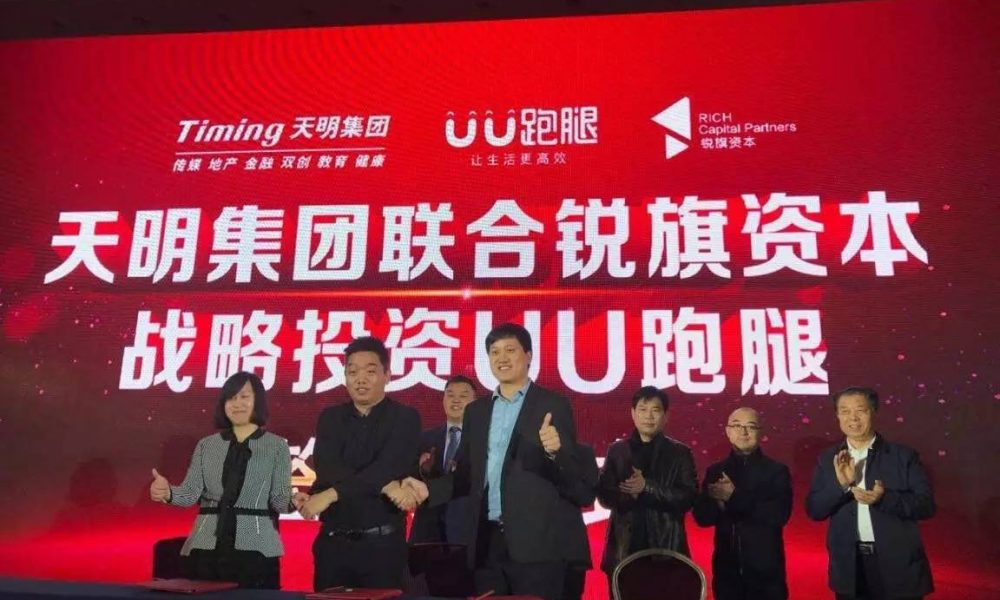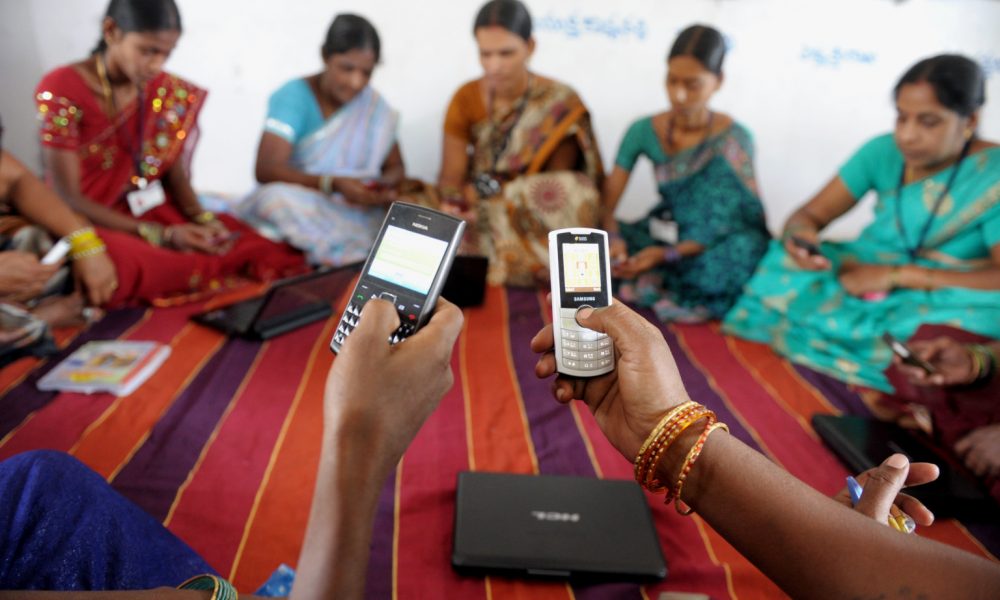Category: Business
Chinese hyperlocal delivery service UUPT.com closes US$13.9 million via Series A
Zhengzhou Time Funnel Information Tech Co., Ltd., a mobile internet company and the developer of flagship product UUPT.com, a platform that connects errands runners to busy city people has raised RMB96 million (approximately US$13.9 million) via its series A round which was led by Timing Group, a Chinese venture capital founded in 1993.
At present, Timing Group has invested in 21 startups and enterprises, including UrWork, We Doctor, UFO, Day Day Up and more, focusing on health, finance, media, internet, and various other industries.
“We hope to look for the winning genes in enterprises and their founding team in Henan and all of China, and to provide them support in terms of culture, talent, system, brand, and resources to help them realise their inspirations, to be better, stronger and bigger,” said Timing Group.
Another participating investor also includes RICH Capital Partners. The investments made on January 8 by both investors has contributed to one of the largest single financing noted in Henan’s local internet and networking history.
Having its operations formally launched in June 2015, UUPT is currently available in Beijing, Shenzhen, Zhengzhou, Xi’an and 30 other cities. The platform claims to have more than 5 million registered users connected to 300 thousand runners.
The errand runner platform uses an all-inclusive operation, which calculates according to a single case, and the platform is only in charge of connecting errand runners and consumers, whereby the platform earns a 20% commission from every completed transaction.
The platform mainly provides city delivery services, allowing users to contact runners through WeChat or their official Website. The transactions made usually involves delivery services within 20 minutes or a 3 km range.
According to UUPT founder Qiao Songtao, these latest proceeds will be mainly used to improve service quality, data mining, talent acquisition and expansion projects in China, establishing their services in Hangzhou, Shanghai, Nanjing and other first-tier cities, as well as building a centralised operation centre in Beijing.
By Vivian Foo, Unicorn Media
Japan-based Mobingi raises US$2.2 million to launch cloud DevOps automation platform
Japan’s cloud automation startup Mobingi announced today that it has secured 250 million yen (about US$2.2 million) in its series A round from its existing investors, Draper Nexus and Archetype Ventures, both are Japan-based Venture Capital.
This round is a follow-on investment subsequent to the tens-of-millions-of-yen (hundreds of thousands of dollars) fundraising from the two firms last February. Following this fundraising, Draper Nexus’s Akira Kurabayashi is also appointed as the Outside Director of Mobingi.
The firm had fundraised 2 million yen (about US$17,500) from Digital Garage in its January 2015 seed round and US$125,000 from 500 Startups. Therefore, with the addition of the new round, the total capital raised is estimated to surpass 300 million yen (about US$2.6 million).
With the latest capitals, Mobingi plans to improve its operation of Mobingi ALM, an application construction automation platform for cloud services, and to launch Mobingi Wave, an application operation-on-cloud automation platform this summer.
Founded in October 2015, Mobingi is a Software-as-a-Service (SaaS) cloud software solution that seamlessly integrates server deployment, management, scaling and cloud application lifecycle automation.
The company provides an operation and maintenance or DevOps (Development-Operation) automation platform for cloud services, supporting both public and private clouds–all on a single, easy-to-use platform designed exclusively for any size of businesses.
“Mobingi targets small and medium-sized enterprises (SMEs) having insufficient money in securing human resources specialized in operation,” said Wayland Zhang, the founder and CEO of Mobingi. “The firm offers an ideal environment where it is easy for engineers to focus on development.”
Besides, Mobingi’s platform services are all compatible with Microsoft Azure, Google Cloud Platform, Fujitsu K5 and Amazon Web Services, in addition to private cloud services based on OpenStack.
“Although most of our current clients are Japanese companies,” said Zhang, “our ambitions are for the firm to commence service provision to Chinese companies within this year and secure a certain sales amount from them utilizing cloud computing.”
According to Zhang, the firm will turn to the enhancement of marketing activities targeting Japanese and Chinese SMEs through participating meetups, seminars, or presentation and exhibition at business conferences beginning this year.
Prior to this, Mobingi is a participant of the Open Network Lab’s 9th batch as well as the 15th batch in the 500 Startups’ acceleration programme.
By Vivian Foo, Unicorn Media
Chinese UrWork raises US$58 million series B from Tianhong Asset Management and others
Chinese co-working space startup UrWork has raised its Series B round of financing worth RMB400 million (about US$58 million) from Tianhong Asset Management Co. Ltd, Junfa Real Estate Group, and a number of other Chinese companies.
Other investors also include Chinese property firm Dahong Group and Tianming Shuangchuang Technology, both based in Henan province, as well as Shanghai-based Chuanghehui Fund.
Founded in 2004, Tianhong Asset Management is the mutual fund unit under Alibaba Group’s financial services unit Ant Financial, providing services to users of Alibaba’s Yue’ebao product. As of June 2015, Tianhong has managed RMB948 billion (about US$138 billion) serving over 220 million individual investors.
UrWork, on the other hand, is founded in April 2015 by ex-senior VP of Wanke Enterprise Mao Daqing and aims to become China’s co-working space leader, providing co-working space to individuals and small companies. It is also often said to be a China’s equivalent of the world’s largest co-working space provider, US-based WeWork.
Since its inception, the company has so far raised six rounds of funding with a total venture fundraising of over RMB1.2 billion (about US$175 million). Its last round, prior to this, was three months ago when it completed a RMB200 million (US$31 million) financing round from Gopher Asset Management Co., Ltd., and others.
Its earlier backers also include Sequoia Capital China, Zhen Fund, Sinovation Ventures, Yintai Land and Zhongrong International Trust Co., Ltd.. After the completion of its Series B financing, the company now faces a valuation of nearly RMB7 billion, that is 45 times from its previous valuation of RMB150 million, making it the country’s first so-called unicorn in the domestic sector.
UrWork currently provides 16,535 desks in 40 co-working space locations across 12 cities in China, in which half of the sites are located in Beijing and the remainder spread across eleven other cities. Rather than owning properties, UrWork signs long-term leases of 10 to 15 years to remain asset-light.
With this latest proceeds, the company will use the capital to improve and simplify domestic and oversea UrWork factory layout, innovate internal service ecosystem as well as to standardise the service output model.
Besides, investments will also go to personnel training and investment projects to enhance the team’s overall professionalism as well as the mobile terminal and intelligence hardware in UrWork.
In addition, URWork also plans to open 36 locations across 16 cities in China, with 120,000 square meters of office space with 20,000 desks this year, in addition to seeking expansion overseas, with planned new sites in Singapore, New York, London and Taiwan.
In early December, the company has signed an agreement with International Enterprise Singapore and CapitaLand Limited, hoping to help Chinese and Singaporean small firms to enter the global market.
By Vivian Foo, Unicorn Media
Indian telecommunications firm Tikona Digital gets US$171 million loan from US govt agency
Telecommunications firm Tikona Digital has recently received a funding of US$171 million in the form of a commercial loan from Overseas Private Investment Corporation, an independent US government development finance agency, according to a report in The Economic Times.
The loan comes as a chance for Tikona Digital, providing the firm with the required liquidity for revival while putting talks of M&A with Telenor to rest.
There were reportedly talks of Tikona’s merger with Norway’s Telenor and leading Indian telecom player Airtel because of the 4G airwaves that it had bought in 2010. However, valuations have been an issue, according to a statement by an investment banker.
“This could be the company’s second coming with renewed interest in the telecom sector and its ancillaries,” The Economic Times quoted a senior investment banker who wanted to remain anonymous.
In October 2015, Tikona Digital Networks, engaged in building the next generation wireless broadband services for home and enterprise customers in India, has announced that it would launch 4G broadband plans in 30 cities by the first half of 2016.
The telecommunications firm currently runs a pilot project in Varanasi to wire the city with 4G technology for home broadband. The company has 20 MHz of broadband spectrum in 5 telecom circles including Gujarat, UP=East, UP-West, Rajasthan, and Himachal Pradesh, for which it had paid Rs 1,058 crore during the 2010 Broadband Wireless Auctions.
Prakash Bajpai, a technocrat, started Tikona’s home WiFi service on free airwaves, but business did not shape up as earlier forecast. In 2012, Tikona consolidated resources shutting service in 12 out of the 38 cities and has now developed technology to provide broadband with 4G technology.
After its latest technology investments, Bajpai said the company can now produce 1GB of data for a mere Rs 5. It is looking to replicate this process in Varanasi in at least 60 more cities within the next 18 months.
“Mobile telecom operators produce a GB of data at about Rs 60 to 70,” said a senior telecom analyst. However, the cost structure for mobile operators and home broadband operators will always be disparate because maintaining mobile continuity is costly.
However, the company is not trying to complete with wireless operators, but instead challenges only BSNI, Tata Teleservices, and other local broadband operators such as Hathaway.
In Varanasi, Bajpai said the company has been able to take on competition and gained around half the market. It is not offering low-end solutions and instead wants to corner the multi-device, heavy users who consume tens of GB data. Bajpai also said the move has resulted in a seven-month break even for Varanasi.
“Varanasi is the first city where 4G services has been launched and plans are to launch 4G network in other cities and circles soon. We are hopeful that subscribers in Varanasi will get to experience world class home broadband services which they can use conveniently for various reasons,” said Prakash Bajpai, the Founder, MD and CEO of Tikona Digital Networks.
The company had earlier secured US$45 million in November 2014 from International Finance Corporation, Goldman Sachs, Oak Investment Partners, Everstone Capital Advisors and L&t Infrastructure Co Ltd.
Tikona plans to use the fresh funds for rolling out the 4G-based broadband services across the country.
By Vivian Foo, Unicorn Media
China Exim Bank fund buys Hungarian telecom firm Invitel for US$214 million
An investment fund established by the Export-Import Bank of China and other institutional investors has agreed to purchase Hungarian telecommunications company Invitel Group at an enterprise value 4.5 times of its 2015 EBITDA, that is €202 million (US$214 million).
The China-CEE fund represents a US$435 million private equity fund, established by China Exim Bank in partnership with central and eastern European institutional investors, with current investments in countries including Poland, the Czech Republic and Bulgaria.
The transaction is subject to customary closing conditions, including local competition authority clearance, and is expected to be completed in the first quarter of 2017.
CEE Equity Partners, the investment advisor to the China CEE Investment Cooperation Fund, is to buy the company from Mid Europa Partners, a buyout investor in central and south eastern Europe with over €4.3 billion (US$4.6 billion) in funds raised since inception.
“Under Mid Europa’s leadership, we have strengthened Invitel’s position in the Hungarian market and we are grateful for their support. We look forward to further developing the business under the ownership of CEE Equity,” said David Blunck, the CEO of Invitel.
TeleGeography’s GlobalComms Database (GCD) notes that Mid Europa’s decision to sell Invitel lies in line with its widespread telecoms sector divestment strategy whereby Mid Europa, focused on the central and south-east part of Europe, sold its only other remaining telco subsidiaries Bite Latvia/Lithuania in Q1 2016.
At present, Invitel is the second-largest incumbent fixed-line telecommunications and fourth-largest fixed broadband Internet operator by subscribers, having delivered business and residential services over a range of access platforms including copper PSTN, cable, fibre, and fixed-wireless.
Invitel is also the PSTN provider in 14 of Hungary’s 54 historical fixed line concession areas, covering more than one million homes in Hungary, including both residential and corporate customers. While its 9,000km fibre-optic transmission backbone network gives it nationwide reach, connecting all the country’s major urban centers, with eleven border crossing point.
Invitel has been controlled by Mid Europa since 2009 and is currently 99.99% owned by Magyar Telecom BV, which in itself is 51 percent owned by Mid Europa’s 100 percent-held unit Hungarian Telecom BV and 49 percent by Cayman Islands-incorporated, UK-registered Matel Holdings Ltd which is owned by bondholders.
Established in 1994, the Export–Import Bank of China, also known as China Exim Bank, is one of three institutional banks in China chartered to implement the state policies in industry foreign trade, as well as to provide financial support to promote the export of Chinese products and services.
China Exim Bank has long been an investor in developing nations in Africa and Asia, but in recent years, the Chinese bank has been expanding its investments in Eastern Europe. Solely owned by the Chinese government and under the direct leadership of the State Council, the bank’s international credit ratings are the same as China’s sovereign ratings.
By Vivian Foo, Unicorn Media





